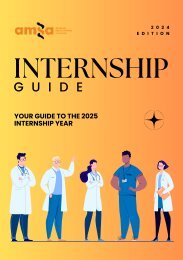Vector Volume 11 Issue 1 - 2017
Create successful ePaper yourself
Turn your PDF publications into a flip-book with our unique Google optimized e-Paper software.
Surgery: Luxury or Necessity?<br />
[Feature Article]<br />
Maryam Ali Khan (Pakistan), Zineb Bentounsi (Morocco), Nayan Bhindi (Australia),<br />
Helena Franco (Australia), Tebian Hassanein Ahmed Ali (Sudan),<br />
Katayoun Seyedmadani (Grenada/USA), Ruby Vassar (Grenada), Dominique<br />
Vervoort (Belgium) -InciSioN international team members<br />
InciSioN, the International Student Surgical Network, is a student-led organisation of<br />
medical students and young doctors from around the globe with one shared passion,<br />
Global Surgery. InciSioN embodies the aim of educating about, advocating for, and<br />
performing research in Global Surgery. Among the 33 members of InciSioN, we share 23<br />
countries spanning over 12 time zones, in 5 continents, and speak over 15 languages.<br />
The seminal report published by the Lancet<br />
Commission on Global Surgery (LCoGS) in<br />
April 2015 highlighted that an estimated 5<br />
billion people continue to lack access to<br />
safe and affordable surgical and anaesthetic<br />
care when required.[1] Often, surgical care is<br />
associated with costly procedures and stateof-the-art<br />
equipment. While that might be true<br />
for a subset of procedures, there are many<br />
lifesaving procedures that are considered<br />
basic public health needs and can be<br />
performed cost-effectively with a simpler set<br />
of equipment. Through domains of research,<br />
education and advocacy, the relatively recent<br />
movement of Global Surgery endeavours to<br />
address and alleviate these vast disparities in<br />
surgical equity, particularly in low and middleincome<br />
countries (LMICs). Here, we would like<br />
to evaluate surgical care on a global scale<br />
from a basic public health standpoint.<br />
Basic surgical care and safe surgery<br />
Surgery is defined by the World Health<br />
Organization (WHO) as “any procedure<br />
occurring in the operating room involving the<br />
incision, excision, manipulation or suturing of<br />
tissue that usually requires regional or general<br />
anaesthesia or profound sedation to control<br />
pain”.[2] Surgery is rendered across all disease<br />
categories, and is an indispensable component<br />
of health care. Essential surgical care is a<br />
distinct concept, meaning surgery necessary<br />
to prevent imminent death or disability. Without<br />
access to essential surgical care, readily<br />
treatable diseases can pose serious threats to<br />
health.<br />
Safe surgery involves avoiding complications<br />
or adverse events that can arise before,<br />
during and after surgical procedures. Thus,<br />
safety measures are implemented before<br />
anaesthesia, before incision, during surgery<br />
and in the provision of post-operative care.<br />
The WHO estimates that every year almost<br />
7 million surgical patients suffer significant<br />
complications, most commonly including<br />
infection, bleeding and various complications of<br />
anaesthesia. More than half of these adverse<br />
events are preventable. In view of this, the WHO<br />
has implemented Guidelines for Safe Surgery<br />
(2009) to define core safety standards, with 10<br />
essential objectives that can be implemented<br />
in any country and any surgical setting. These<br />
serve to reinforce the standardisation of safe<br />
practices, particularly in developing countries.<br />
Cost of basic surgical care<br />
Access to safe anaesthesia and surgery,<br />
or lack thereof, has a considerable economic<br />
impact on both patients and society.<br />
22

















